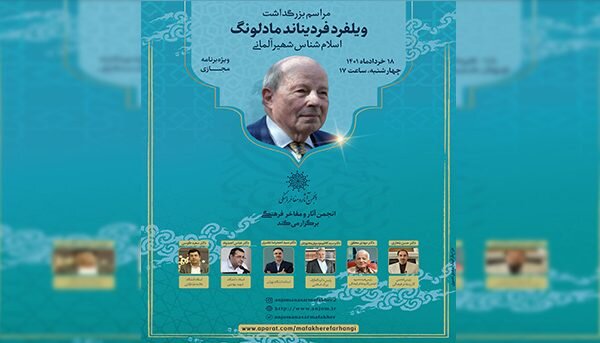Tehran meeting to commemorate Islamic scholar Wilferd Madelung

TEHRAN – The Iranian Society of Cultural Works and Luminaries has arranged an online program to commemorate German author and scholar of Islamic history Wilferd Ferdinand Madelung, ILNA reported on Tuesday.
Several Islamic scholars, researchers as well as members of the association including its director Hassan Bolkhari are scheduled to attend the program set for Wednesday, the report added.
Born in 1930, Madelung specializes in Islam and Shia studies and has written about 200 books and essays about these subjects throughout his career. “The Succession to Muhammad (s)” is one of his major works in which Shia’s view of succession after the Holy Prophet (s) is affirmed. His introduction of Shia to the West is also noteworthy.
His view in comparison with other orientalists is more knowledgeable and fair but due to his cultural, political, and social limitations, he was not able to explain the problem completely.
Madelung has referred to the Holy Quran’s view in regards to the prophet’s successorship at the beginning of his book and believes that the Quran has no verse in regards to this matter, however, it has many recommendations for looking after the family and relatives of the Prophet.
Also, he has mentioned the approach of previous prophets in choosing the successor which states that they usually tend to choose one among their relatives as their successor and had this idea that through those verses it could be concluded that the Holy Prophet was concerned with the severity of this matter and had liked to choose a person among his family to be his successor, but before he was able to do so, his death arrived suddenly and he was not able to complete his task.
Making the balance between concision and loyalty to texts and traditions was one of the goals Madelung had when writing the book. He argued that most Western historians mistrust Islamic sources of early Islam, which have been characterized as old myths. He sought to review the analysis of these events based on the most relevant sources of the period while maintaining a balance between concision and loyalty to texts and traditions.
“Religious Trends in Early Islamic Iran”, “Religious and Ethnic Movements in Medieval Islam”, “An Ismaili Heresiography”, “The Advent of the Fatimids: A Contemporary Shi'i Witness”, and “Religious School and Sects in Medieval Islam” are among his credits.
ABU/AFM
Leave a Comment